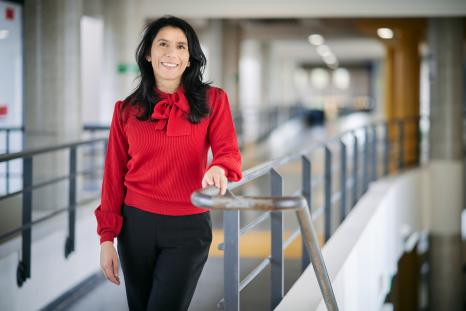
Ester Mariucci: an explorer of mathematical elegance
Ester Mariucci is a mathematician who has been a Professor in the Department of Mathematics at the University of Versailles Saint-Quentin-en-Yvelines (UVSQ) since September 2020. With a keen interest in the theoretical dimension of mathematics, she positions her research at the intersection of applied probability and mathematical statistics. She is also responsible for the Mathematics and Statistical Learning (Math&AS) master's programme, part of the Mathematics and Applications track at Université Paris-Saclay.
By the time she graduated from secondary school in Italy, Ester Mariucci was a well-rounded student, equally interested in the sciences as well as literature, history and philosophy. Today she explains that she chose to study science in order to "have it all". "At that time, I naively thought that it would be easier for me to cultivate my taste for the humanities on my own than for the sciences... As for choosing mathematics over other scientific disciplines, it was obvious to me, as I found it so immediately satisfying," remembers Ester Mariucci. This satisfaction was suddenly challenged when she began her studies at the University of Pisa. "I found myself plunged into a very competitive world, where mathematics seemed hard and I was no longer experiencing pleasure, only frustration," she recalls. Fortunately, at that time, she could count on the support of some demanding and passionate professors, who helped her rediscover her desire to study mathematics and who continue to inspire her today, as she teaches in turn.
Between Pisa and Grenoble: from applied probability to theoretical statistics
After five years at the University of Pisa, in 2010 she decided to follow her fiancé to France and continued her studies in Grenoble, where she enrolled in a master's programme and thrived. "The professors were very kind, which helped me to integrate very easily. What's more, coming from a background heavily focused on probability, in Grenoble, I discovered the exciting world of theoretical statistics." She then wrote her thesis on Le Cam's theorem applied to stochastic processes. "It could hardly have been more theoretical. It was really about elegance, but it enabled me, after completing my thesis in 2015, to move to Berlin to work in the team of Markus Reiss, a leading specialist in the statistics of stochastic processes."
Between Berlin and Leiden: discovering Bayesian statistics
While her fiancé had joined her in Berlin and she had secured a scholarship from the Alexander von Humboldt Foundation to continue her research in Germany, Professor Aad van der Vaart, a world expert in non-parametric Bayesian statistics, offered her a postdoctoral internship at the Mathematical Institute of Leiden University. "It was impossible to refuse such an offer! Fortunately, I was able to negotiate the postponement of my scholarship. So I moved to Leiden, where I trained with the best researchers in the field on Bayesian statistics, which still have an important role in my current research." After completing her postdoctoral internship, she returned to Berlin and joined Markus Reiss’ research group. "I then had the chance, once again, to work alongside an excellent team while enjoying a great deal of independence thanks to my Foundation scholarship." The young researcher, who was exempt from teaching duties, took the opportunity to increase her time abroad and began to think about where she should continue her career.
Between Magdeburg and Potsdam: first steps as a professor
On the advice of Markus Reiss, who wanted her to stay in Germany, she applied, somewhat sceptically, to the University of Magdeburg, where, against all odds, she was accepted. "However, shortly afterwards, I was offered a position as Vertretung Professorin (equivalent to a professorship in France) at the University of Potsdam," explains Ester Mariucci. Once again, fortune favoured the young researcher, as the University of Magdeburg granted her a year's leave to go to Potsdam. "There, I experienced the profession of professor in its entirety. Of course, I had already taught during my thesis and in Berlin, but this time the responsibility was completely different. I had to teach stochastic processes, non-parametric statistics, data assimilation, participate in a data science master's programme, etc. It was the equivalent of 200 teaching hours in France. I found it fascinating." After her year in Potsdam, she returned to Magdeburg. Just as she was expecting her first child and the health crisis was making it impossible for her to travel, she learned that a professor position was opening up at UVSQ. She applied remotely, got the job and moved to Versailles just after the birth of her baby.
Arriving in Versailles: creation of the data science master's programme
For Ester Mariucci, a very busy period began, especially in terms of teaching. Alongside her research work at the Mathematics Laboratory of Versailles (LMV - Univ. Paris-Saclay, National Centre for Scientific Research CNRS, UVSQ) and her undergraduate teaching, she also gave courses in the master's programme in mathematics and computer science applied to the humanities and social sciences (MIASHS). "Having been used to very theoretical teaching, I found myself giving very applied courses in insurance, data processing, etc., and working tremendously hard to offer the best to my students," she recalls. She continued this approach by getting involved in the launch of a new data science master's programme at Université Paris-Saclay in 2021 - the Master's degree in Mathematics and Statistical Learning - where she is currently in charge of the 2nd year master's programme and in which she teaches non-parametric statistics, Bayesian statistics, stochastic processes, statistical inference, etc. "As this is a research master's degree open to the corporate world, my main challenge is to ensure that my students have a sufficiently solid theoretical background to pursue a thesis if they so wish, but also to provide them with methodological tools useful in the business world," explains Ester Mariucci.
Applying mathematical tools to climatology
In terms of research, Ester Mariucci continues to focus on Bayesian statistics, particularly by participating in a research project led by a colleague from Sorbonne University and funded by the French National Research Agency (ANR). However, she has also stated her intention to give a new direction to her work. "Up to now, I've focused a lot on everything related to the quantification of uncertainty and the reduction of complexity in the statistical sense, with the aim of finding simpler models but containing the same amount of statistical information. Today, using the same tools, namely mathematical statistics and stochastic processes, I would like to tackle issues in climatology and ecology, especially to contribute to a better understanding of how statistical information depends on and varies according to the nature of observations, both in space and time." A new goal that drives her to forge new collaborations, and will undoubtedly allow her to add a new chapter to her already rich yet young research career.
